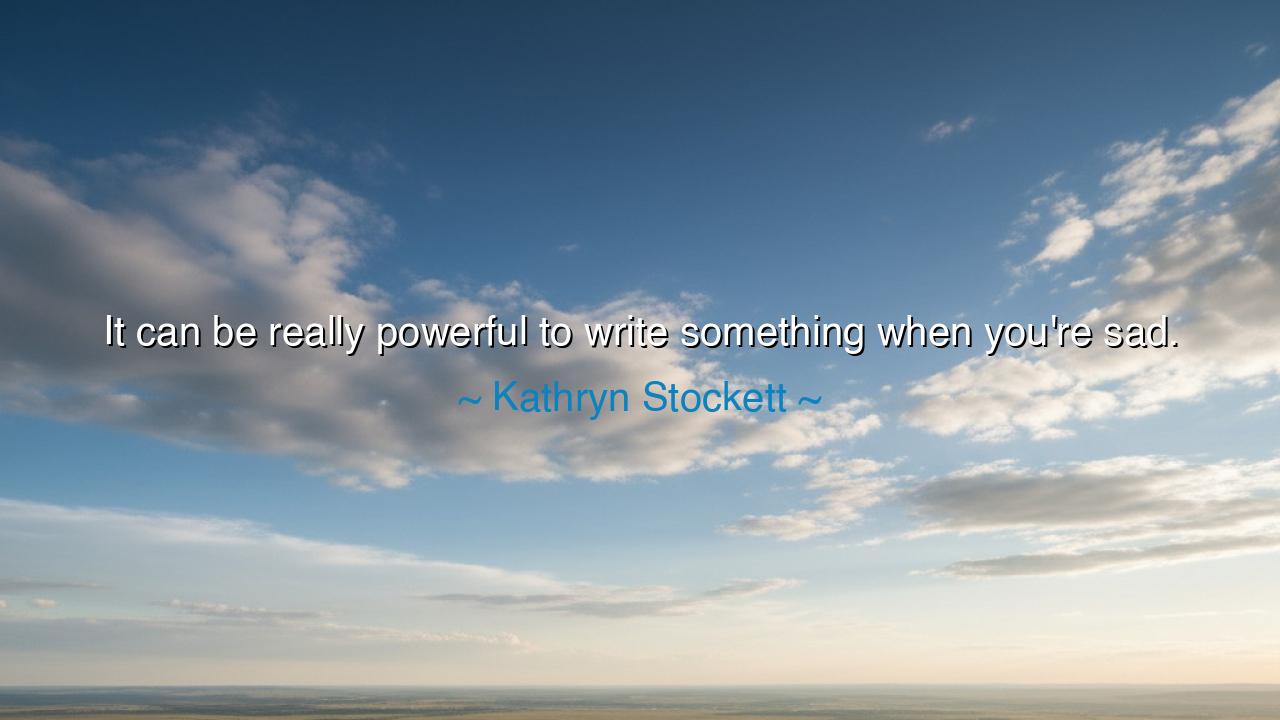
It can be really powerful to write something when you're sad.






Hear the simple yet profound words of Kathryn Stockett: “It can be really powerful to write something when you’re sad.” In these few words, she uncovers a truth that poets, prophets, and storytellers have known for ages—that sorrow, when given form through language, transforms into strength. For grief left unspoken festers in silence, but grief expressed upon the page becomes light, guidance, and even beauty for those who encounter it.
The act of writing while sad is not merely the spilling of tears onto paper. It is the channeling of raw, unrefined emotion into shape and meaning. Sadness opens the heart, making it tender, vulnerable, and deeply alive. In this rawness, the words that emerge often carry an authenticity more piercing than anything born of comfort. Stockett’s reflection reminds us that suffering, though painful, can become a wellspring of creativity and even healing.
The ancients revered this mystery. The Psalms of David are filled with cries of anguish, laments of betrayal, and confessions of despair. Yet because they were written in the depths of sadness, they carry a power that has endured across millennia, offering solace to countless souls. Likewise, the tragedies of Sophocles and Euripides spoke not of joy but of pain, yet through them entire cities found catharsis, the purging of emotion that renewed the spirit of the community. Thus, sorrow, when written, becomes not destruction but purification.
History gives us further proof. Consider Vincent van Gogh, whose letters to his brother Theo reveal both torment and transcendent vision. Though afflicted by despair, his writing and painting turned his suffering into immortal beauty. Or think of Anne Frank, who, in the shadow of war and oppression, wrote with astonishing clarity about fear, hope, and humanity. Her sadness became a voice for millions who could not speak. Their power did not come despite their sadness, but because of it.
From this we learn that sadness, though unwelcome, can be a teacher. It strips away illusions, focusing the heart on what is real. When we choose to write in such moments, our words often bypass pretense and strike directly at the essence of human experience. This is why Stockett calls it “powerful”: because sorrow-written does not merely describe, it reveals. It shows us to ourselves and to one another in ways joy alone cannot.
The lesson is clear: when sadness visits you, do not flee it or bury it in silence. Take up the pen, the instrument, the voice, and give your grief shape. Write not only for others, but for yourself—for clarity, for healing, for the relief that comes from expression. And if you fear your words are too raw or too broken, remember that brokenness itself carries power, for it is the common language of humanity.
So let Stockett’s words be remembered as wisdom for the ages: writing in sadness is not weakness but strength. It is the alchemy that turns sorrow into meaning, pain into connection, grief into legacy. In this act, you do not merely endure your sadness—you transform it into something eternal. And in that transformation lies the deepest power of all: the power to remind others, and yourself, that even in sorrow, the human spirit can create light.






AAdministratorAdministrator
Welcome, honored guests. Please leave a comment, we will respond soon